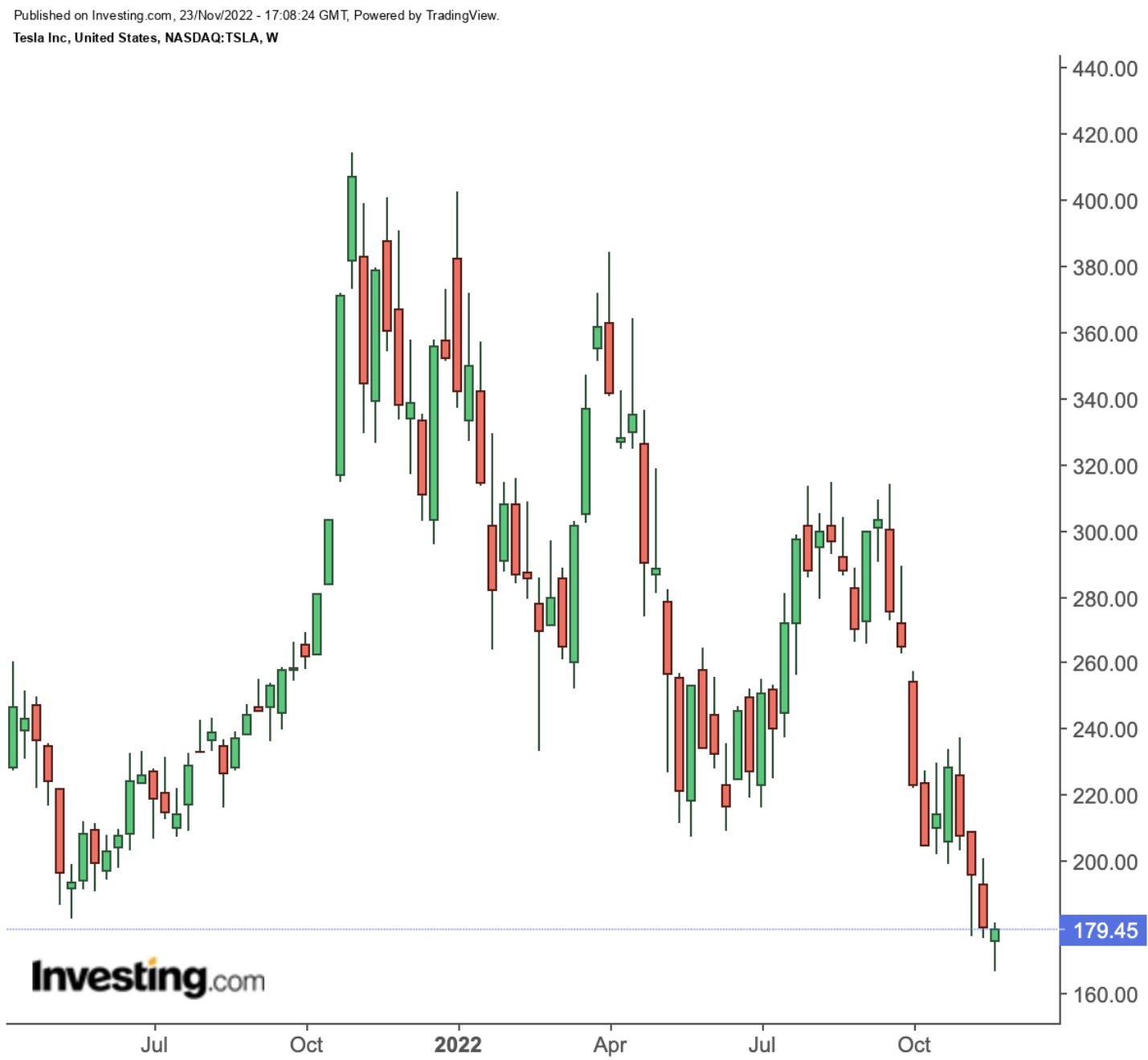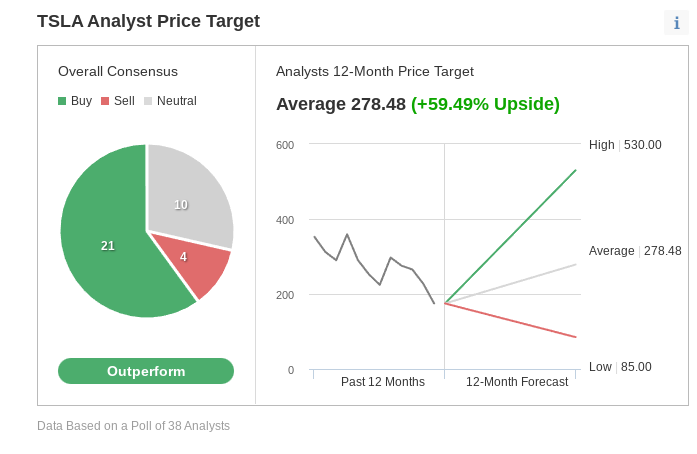- Tesla's decline this year may be attributed to many headwinds—some cyclical, some unique to the company
- The biggest threat is a potential slowdown in demand as consumers avoid discretionary purchases
- However, after losing 50% year-to-date, some analysts are starting to make a buy call on the stock
Shares of Tesla (NASDAQ:TSLA) have been on a slippery slope this year. After touching trillion dollars in market capitalization in April, the world's largest electric carmaker lost 53% of its market value, or roughly $530 billion. Year-to-date, losses are hovering around the 50% mark.
After this steep and persistent decline, some analysts are calling Tesla stock too cheap to ignore. This year's slump has left the stock trading at 31 times forward earnings, down from more than 200 times in early 2021.
In a note today, Morgan Stanley said that Tesla is approaching its "bear case" price target of $150, presenting an opportunity for investors to scoop up shares at a bargain price. Likewise, Citi analysts upgraded the company to neutral from sell, saying that a more than 50% slump this year "has balanced out the near-term risk/reward."
These bullish comments are also reflected in an Investing.com poll of 38 analysts whose consensus 12-month price target reflects a 59% upside potential.

Source: Investing.com
But before making a bet on Tesla, it's essential to understand why the carmaker has lost investors' faith this year despite its clear dominance in the field. Tesla's decline can be attributed to many headwinds, some cyclical and some unique to the company.
Demand Slowdown
The biggest threat is a potential slowdown in demand after central banks worldwide embarked on an aggressive monetary tightening drive that increased the risk of a recession. That, combined with the rate of inflation near four-decade high, supply-chain issues, and strict Chinese COVID policies, make it difficult to sell cars to consumers who are cutting back on their discretionary purchases.
Even Tesla's CEO, Elon Musk, acknowledged threats in last month's earnings call, saying demand was "a little harder" to come by because of economic downturns in China and Europe and the Federal Reserve's interest rate increases. Tesla has already reduced prices in China, and it won't be surprising if the company makes further cuts in the coming weeks.
Besides these macro issues, Elon's purchase of Twitter also weighs on the company's stock price. Investors fear the billionaire's deep involvement in overhauling the social-media company will dilute his focus and hurt Tesla's competitive advantage.
Tesla lost more than $300 billion in market cap during the past two months when the Twitter deal was finalized, and Musk took over as its CEO.
Agonizing Cycle
Wedbush's Dan Ives, one of the most bullish analysts of Tesla, has removed the carmaker from his top ideas list, saying Musk has "tarnished" Tesla's story and stock in turn. His continued selling of Tesla's stock to raise enough money for the Twitter deal has created an "agonizing cycle" for investors to navigate and left them in an "albatross."
Despite all these blows, Tesla remains the dominant electric vehicle brand in the U.S. and abroad, and it's hard to ignore its long-term value.
Setting aside short-term economic headwinds and the negative PR from Musk's Twitter experiment, here is a company well-positioned to benefit from the global shift to electric cars and clean technologies.

Source: EV Volumes
Just over half of passenger cars sold in the U.S. will be electric vehicles by 2030, according to a report from BloombergNEF, thanks in part to consumer incentives included in the $374 billion in new climate spending enacted by President Joe Biden. Tesla is the only EV maker that has achieved the scale to satisfy this mass market.
Tesla finished upgrading production lines at its factory in Shanghai in September to double the plant's annual output to 1 million vehicles. The company is also expanding its production capacities in Europe, where incumbent carmakers, including Volkswagen (ETR:VOWG_p) and Mercedes Benz (OTC:DDAIF), are struggling to achieve scale and damage Tesla.
Highlighting this strength, Deutsche Bank, in a recent note, said:
"We view 2023 as a pivotal year for Tesla in which it will continue to grow volumes at a high pace, enter new segments with Cybertruck and Semi, optimize its manufacturing and cost footprint, and benefit from IRA (Inflation Reduction Act), which will lower its costs and boost demand."
Bottom Line
No doubt, Tesla is a highly volatile stock and not cut out for investors with a low-risk tolerance. However, if you believe in the coming titanic shift in the transportation industry, avoiding Tesla doesn't make sense.
The stock's current weakness offers an attractive entry point if you want to make a move now.
Disclosure: As of the time of writing, the author doesn't own Tesla stock. The views expressed in this article are solely the author's opinion and should not be taken as investment advice.
